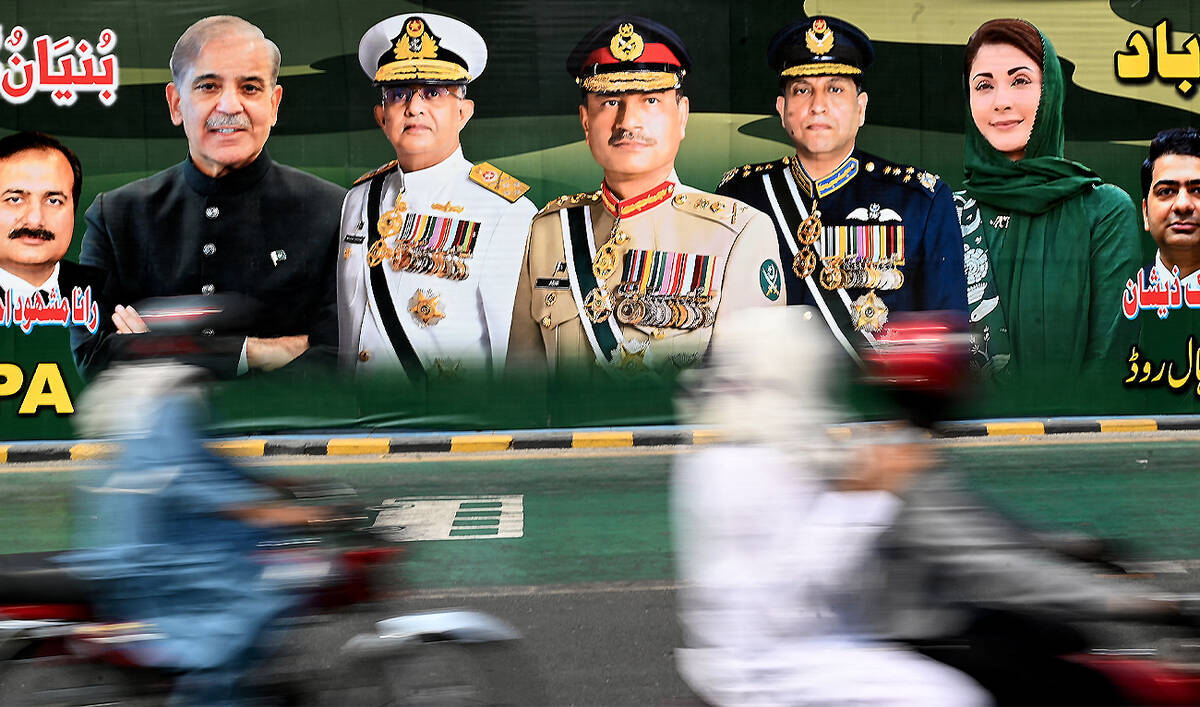ISLAMABAD: Pakistan will be sending a dossier, which outlines the chain of events in its military standoff with India this month, to world powers to urge them to hold New Delhi accountable for its “aggression and attacks on civilian population” in Pakistan.
The dossier will be presented to foreign capitals by a high-level delegation formed by Prime Minister Shehbaz Sharif last week. The delegation, led by former Pakistani foreign minister Bilawal Bhutto-Zardari, is tasked with effectively presenting Pakistan’s case before the world.
The document, seen by Arab News, contains details of an April 22 attack in Indian-administered Kashmir, India’s subsequent strikes against Pakistan and Islamabad’s response to them, the ensuing four-day military standoff, international media coverage, images of the attacked sites, and specifics of Pakistan’s countermeasures.
“Pakistan reaffirms its commitment to regional peace and stability and international community must hold India accountable for its aggression and attack on innocent women and children,” the dossier reads.
India blamed the April 22 attack that killed 26 people on Pakistan and on May 7, New Delhi attacked what it called “terrorist camps” in multiple Pakistani cities. Islamabad has denied complicity and called for an international probe into the assault.
The four-day military conflict came to a halt after United States (US) President Donald Trump announced a ceasefire on May 10, offering to help settle longstanding dispute between the two nations.
The Pakistani dossier says that India had repeatedly used “false-flag operations” and its immediate blaming of Pakistan for the attack raised “serious concerns about the integrity of its claims” as standard investigative procedures required time and forensic examination.
“The Pahalgam incident followed the same pattern of manipulation and manufactured provocation,” the dossier says, noting that Pakistan sought evidence from India and proposed a joint investigation.
“However, these proposals were not only rejected by India but India also continued to attack civilians inside Pakistan.”
Members of Pakistan’s high-level delegation, tasked with visiting London, Washington, Paris and Brussels, described this outreach to the international community as “absolutely imperative.”
“The region stands at a key inflection point in the wake of India’s unprovoked aggression and its egregious reshaping and deliberate distortion of facts as active state-sponsored disinformation,” Senator Sherry Rehman, a member of the Pakistani delegation, told Arab News.
“We have obviously prepared a detailed dossier that documents not just recent violations but also India’s longstanding record of state-sponsored terrorism inside Pakistan,” she said, adding that Pakistan has chosen diplomacy over escalation.
“This dossier is not a political tool, it is a factual record of aggression and hybrid warfare, including India’s unilateral suspension of the Indus Waters Treaty, which constitutes a grave violation of international law and a weaponization of water against civilian populations.”
Rehman said the aim of the delegation will be to reinforce Pakistan’s position as a responsible state, seeking peaceful resolution “through diplomacy and facts, not aggression or media manipulation.”
“It is also to seek global support for de-escalation frameworks, including calls for renewed dialogue on Kashmir as a flashpoint, and to safeguard regional water security through multilateral oversight,” she added.
India suspended on April 23 the World Bank-mediated Indus Waters Treaty of 1960 that ensures water for 80 percent of Pakistani farms, saying it would last until “Pakistan credibly and irrevocably abjures its support for cross-border terrorism.”
Separatist groups have waged an insurgency in Indian-controlled Kashmir since 1989, demanding independence or a merger with Pakistan. New Delhi accuses Pakistan of backing the militants, Islamabad denies it and says it only supports Kashmiris diplomatically and politically.
Jalil Abbas Jillani, another Pakistani delegate and a former foreign secretary, said it is extremely important for Pakistan to share its concerns over the aggressive Indian behavior, genesis of the Kashmir dispute, and violations of the Indus Waters Treaty and its implications on peace and stability in the region.
“The delegation will also apprise the international community of the support being extended by India to terrorist outfits like BLA [Baloch Liberation Army] and TTP [Tehreek-e-Taliban Pakistan], etc,” he told Arab News.
New Delhi denies supporting the BLA, TTP or any such groups in Pakistan. India has also sent multiple all-party delegations abroad to extend its diplomatic outreach over the recent conflict.
Former Pakistani diplomats and experts called the submission of the dossier a “right approach” by Pakistan to brief the world about Indian actions.
“Pakistan’s recent step of submitting yet another dossier is again a step in the right direction as India has been selling its narrative on false grounds,” former Pakistani ambassador to the United Kingdom Nafees Zakaria told Arab News.
He said there was no reason for the international community not to pay due attention to Pakistan’s “evidence-based dossier” against India.
“Western world led by the US, which sees India as its lynchpin in the region as a counterweight to the rising powers China and Russia, has been looking the other way, which allowed India to indulge in criminal activities and subversion with impunity,” he said, adding that Pakistan must present its narrative and rigorously pursue it to ensure that India is “called to account and pays for its crimes.”
Former foreign secretary Aizaz Ahmed Chaudhary said Pakistan needed to convey its perspective as India had hardly presented any evidence to the world to support its accusations, which resulted in the military standoff.
“It should be a proactive agenda on our part, meaning we should compile dossiers on India’s involvement in terrorism in Pakistan, evidence for which is now plentiful,” he told Arab News.
He said India had better accepted the offer made by President Donald Trump to sit and talk with Pakistan to resolve the Kashmir dispute.
“The sooner India does that the better it would be for it and for the peace in the region,” he added.
Bitter rivals India and Pakistan have fought three wars, including two over the disputed region of Kashmir, since gaining independence from British rule in 1947. Both claim the Himalayan territory in its entirety but rule it in part.



















